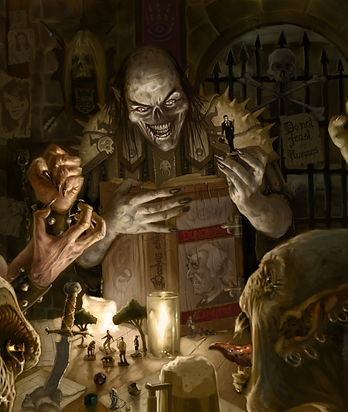
Dungeons & Dragons isn't just a game. It's an experience. Typical board and tabletop games operate under the premise of simply being a board game; players aren't operating as anything or anyone but themselves as players, working towards an end goal in a competitive fashion. Even themed board games, which assign players a specific playing piece or representative icon within the context of the game, don't require players to live vicariously through their playing pieces. Games like this aren't meant to create a separate reality for characters. Monopoly® doesn't require players to act as if they are actually a tophat or racecar, and Chutes and Ladders® doesn't expect players to feel like they are traversing slides at precarious elevations.
In this respect, D&D is different. The gaming experience is meant to immerse players in another reality, complete with unique people, places and things which populate the regions of that world. Because of the immense amount of detail which colors the game, D&D is often likened to interactive storytelling between players. Consequently, the game itself is entirely built upon social interactions, and the decisions which players make both individually and in concert determine the outcome of every situation within the game (as mentioned in the overview of D&D).
From Fantasy to Reality

This dependence on player involvement and interaction within the parameters of a fantasy world evokes an interesting concept of alternate realities. Before elaborating on this concept, it is important to distinguish what exactly is meant by "alternate reality". When interacting within the context of the game, players act 'in-character'. Meaning, they operate under the pretense that they are their character, with all of the knowledge, social graces and other facets of personality which their characters possess. This is a far cry from other games, which don't expect participants to play under the pretense of being someone else. This is not to say that players of D&D labor under delusions of being wizards and figthing mythical beasts in reality, but rather that they empathize with the environment of the game to the extent that they are able to operate, to the best of their abilities, as their character, in that world.
Operation within this alternate reality of the game raises a few interesting questions. For starters, how is it that players are able to interact in such detail in a world that doesn't even exist? Does this interaction have the capacity to change the way humans interact with their environments in the "real world"? To answer these questions, it may be helpful to identify the similarities and differences which exist between these two realities, as well as identify the skills that are used when functioning within them (more on this later).


